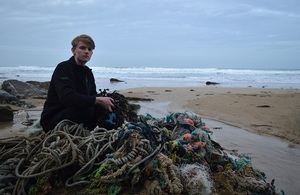Southampton communities work together to tackle plastic pollution
Press release
Ambitions to reduce avoidable plastic waste in the Southampton area have taken a step forward at a virtual workshop run by the Environment Agency.

Environment Agency officer on beach with plastic pollution
Community groups and organisations with an environmental interest invited to the event last week were encouraged to share experiences and work together to prevent plastic pollution and inspire behaviour change.
The workshop was delivered by the plastics and sustainability team as part of a programme of partnership activity in England and France for the Interreg Preventing Plastic Pollution project, which identifies and targets plastics hotspots from river to sea.
Environment Agency officer Jonathan Harvey, from the plastics and sustainability team, said:
Influencing positive behaviour change is an important part of making long-term sustainable changes to protect wildlife and marine life from harmful plastics. By working with zero waste groups, public sector bodies, businesses and others, we want to spread this message and enable appropriate action to reduce avoidable plastic waste.
Workshop attendees had the chance to find out about the impact of plastic pollution, how to organise litter picks, access useful guidance and materials, and get involved with existing local projects.
Preventing waste plastic entering the environment by cracking down on waste crime and poor waste management is a key activity for the Environment Agency as a regulator. As an influencer, it also has an ambition to promote better environmental practices that result in a reduction of plastic waste, helping to achieve the goals and commitments outlined in its 5 year plan to create better places for people, places and the environment, and the government’s 25 Year Environment Plan.
Experts believe around 10 million tonnes of plastic waste enter the ocean every year, of which approximately 50% of marine litter is made up of single-use items.
To find out more about the workshop email plasticsandsustainbility@environment-agency.gov.uk.
If you spot a serious plastic pollution incident contact the 24-hour incident hotline on 0800 80 70 60.
Published 16 March 2021
